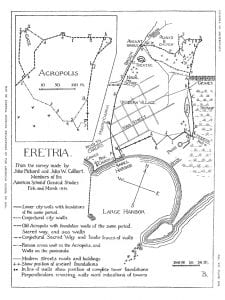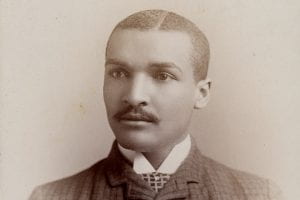As many of us in the archaeology field are aware, there is a large disparity between the white (European ancestry) archaeologists and African American and descendant group archaeologists. This is a pretty whitewashed field for one that studies so many different cultures. Many organizations including the Black Trowel Collective and Society of Black Archaeologists are trying to diversify archaeology through outreach, education, and financial support. On the homepage of the Society of Black Archaeologists, there is a panel hosted by Ayana Flewellen on Archaeology in the Time of Black Lives Matter. I highly recommend listening to it. The link is here. In honor of Black History Month, this post will highlight a major figure in archaeological history, classical archaeology, and black history.
John Wesley Gilbert (1864-1923) is considered the first black archaeologist in America and holds a number of other firsts. He was the first black person to receive a master’s degree from Brown University in 1891, first black professor at Paine College, and the first person to map Eretria in Greece. Because of his passion for ancient languages, he attended the American School of Classical Studies in Athens (still active today) with a scholarship. This was where he discovered, excavated, and mapped the ancient city of Eretria. When he returned to the US, he became a professor at Paine College. He criticized the European based textbooks and education system, seeking a new system that would allow African American students to thrive.
Gilbert faced many struggles to even begin his

Gilbert and Pickard with an unknown Greek man at Eretria Source: https://www.ascsa.edu.gr/
education. He was born into a slave family in who were freed after the Civil War. He lived with only his mother in Augusta, GA who worked as a domestic servant and Gilbert attended segregated public school. He began his high school education at the Augusta Institute for black ministers and teachers. Eventually, he attended Paine Institute where he was mentored by minister George William Walker who helped Gilbert attend Brown University. He became the first black student and one of the first 50 scholars to attend the American School of Classical Studies in Athens where he explored Greece and along with John Pickard excavated and mapped Eretria and the tomb of Aristotle.

Gildert’s map of Eretria Source: https://www.ascsa.edu.gr
This highly accomplished man not only paved roads for future African American archaeologists but also provided valuable information about classical Greece and spent his life inspiring and teaching others, specifically a wealth of languages. Among his students were Channing Tobias and John Hope who would become leaders of the NAACP. His accomplishments also extend past archaeology. Between 1911 and 1912, Gilbert went on a mission trip to the Belgian Congo where he translated the New Testament from Ancient Green to Tetela. He was also an active patriot during World War I.
With this very impressive history and achievements in archaeology, I would have expected to have learned about Gilbert in the classics-based ungraduated archaeology program. While I do not remember all the archaeologists I learned about during that time, I am pretty sure that Gilbert was not mentioned or possibly only mentioned in passing. This is a shame and should be fixed in the future. I even attended an excavation hosted by the American School of Classical Studies in Athens, where his major accomplishments were done and heard nothing. One of the main ways to encourage others to pursue fields such as archaeology is to provide role models. While anyone can be a role model, those that are most effective are often the ones that come from similar backgrounds as the up-and-coming archaeologists. Female archaeologists inspire female students, indigenous archaeologists inspire indigenous students, and black archaeologists inspire black students. The more visible minority groups are and the more their accomplishments are appreciated the more inspiring their story.
For more information:
John Wesley Gilbert: The first African-American Archaeologist
https://www.ascsa.edu.gr/news/newsDetails/john-wesley-gilbert-room
https://www.blackpast.org/african-american-history/john-wesley-gilbert-1863-1923/
Follow IUP Anthropology on Facebook, Twitter, and Instagram
